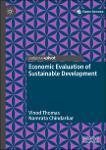Search
Author
- Almas, Heshmati (1)
- Chindarkar, Namrata (1)
- Esfandiar, Maasoumi, (1)
- Friedrich, Schneider (1)
- next >
Subject
- Economic Policy (3)
- Economics (3)
- Financial Economics (2)
- Asian Economics (1)
- next >
Date issued
Has File(s)
- true (6)
Search Results
The Shadow Economy: Challenges to Economic and Social Policy, The Concept of the Survey of Businesses and Entrepreneurs Operating Informally, Causes of the Shadow Economy, What Is the Extent of the Shadow Economy in Serbia? Shadow Economy in the Business and Entrepreneurial Sectors, Effects of Formalisation of the Shadow Economy, Analysis of the Administrative Capacity of the Institutions in Charge of Overseeing the Operations of Business Entities, Main Findings and Recommendations, Executive Summary. |
This book looks at the major policy challenges facing developing Asia and how the region sustains rapid economic growth to reduce multidimensional poverty through socially inclusive and environmentally sustainable measures. Asia is facing many challenges arising from population growth, rapid urbanization, provision of services, climate change and the need to redress declining growth after the global financial crisis. This book examines poverty and related issues and aims to advance the development of new tools and measurement of multidimensional poverty and poverty reduction policy analysis. The book covers a wide range of issues, including determinants and causes of poverty and its changes; consequences and impacts of poverty on human capital formation, growth and consumption; asse... |
This book addresses the issue of how a country, which was incorporated into the world economy as a periphery, could make a transition to the emerging state, capable of undertaking the task of economic development and industrialization. It offers historical and contemporary case studies of transition, as well as the international background under which such a transition was successfully made (or delayed), by combining the approaches of economic history and development economics. Its aim is to identify relevant historical contexts, that is, the ‘initial conditions’ and internal and external forces which governed the transition. It also aims to understand what current low-income developing countries require for their transition. Three economic driving forces for the transition are iden... |
Why should people - and economies - save? This book on the savings problem in Latin America and the Caribbean suggests that, while saving to survive the bad times is important, saving to thrive in the good times is what really counts. People must save to invest in health and education, live productive and fulfilling lives, and make the most of their retirement years. Firms must save to grow their enterprises, employ more workers in better jobs, and produce quality goods. Governments must save to build the infrastructure required by a productive economy, provide quality services to their citizens, and assure their senior citizens a dignified, worry-free retirement. In short, countries must save not for the proverbial rainy day, but for a sunny day - a time when everyone can bask in t... |
This book presents methods to evaluate sustainable development using economic tools. The focus on sustainable development takes the reader beyond economic growth to encompass inclusion, environmental stewardship and good governance.
Sustainable Development Goals (SDGs) provide a framework for outcomes. In illustrating the SDGs, the book employs three evaluation approaches: impact evaluation, cost-benefit analysis and objectives-based evaluation.
The innovation lies in connecting evaluation tools with economics. Inclusion, environmental care and good governance, thought of as “wicked problems”, are given centre stage. The book uses case studies to show the application of evaluation tools. It offers guidance to evaluation practitioners, students of development and policymaker... |
This book focuses on the achievements, current trends and further potential of microfinance to scale-up and serve many more clients with financial services that enable them to improve their living conditions. The book asks what it takes to achieve sustainable impact: to know your clients and to understand their needs, to treat them in a fair and transparent way, and to safeguard the synthesis between the financial and social dimension of sustainable microfinance. The book also sheds light on the future funding landscape and what is necessary to bring more commercial funders on board while ensuring that these new funders will continue the commitment to responsible finance. While being forward looking, the book reflects the debate on core values of microfinance, triggered by recent cr... |






